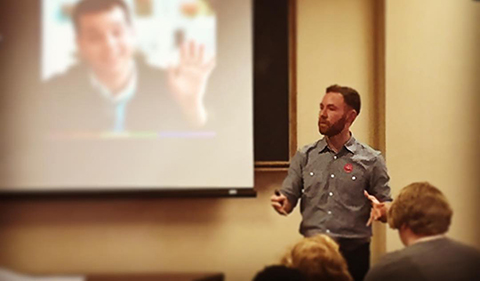
Travis Speice
By Kelli Chapman
Travis Speice talked to a sociology class in March about the role of masculinity in gay men’s identity construction.
Students became particularly engaged in the conversation around gay stereotypes and the construction of various labels such as “bear,” “otter,” “queen,” and “twink.”
Drawing from previous discussions of hegemonic masculinities, students quickly began discussing how these stereotypes and labels further marginalize some gay men, while privileging others.
Speice is an Assistant Professor at The Christ College of Nursing & Health Sciences in Cincinnati and a doctoral candidate at The University of Cincinnati. Speice received B.S. degrees in sociology and psychology from State University of New York College at Brockport in 2005. He earned his M.A. from University of Cincinnati in 2009 with his thesis, “Relationship Between Mode of HIV Transmission, Social Support, and Coping Strategies.” Speice’s current Ph.D. work examines the intersection of gender and sexuality, specifically exploring how gay men understand and manage the expression of their gender and sexual identities.
His talk at Ohio University focused on data collected for his dissertation, introducing the concept of hegemonic sexualities, or how some forms and ways of being gay are more privileged than others and how this overlaps with expressions of gender.
SOC 3720 Sociology of Masculinity
The course Sociology of Masculinity examines the sociological developments in the study of men and masculinity. The course focuses on the construction of masculinity in family, work, education and other social institutions. By examining a wide variety of masculinities, the course also explores how masculinity is affected by and affects racial, gendered, and sexual identities.
Speice talked about the various ways his respondents discussed performing their gendered and sexual identities, by altering their dress, actions, language and even tone of voice in various social contexts, from the workplace to online dating spaces.
Understanding the ways that sexuality operates as a stratification tool helped students to see the ways that even marginalized populations are composed of their own marginalizing constructs, creating hierarchies within hierarchies.



















Comments